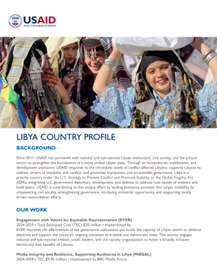LIBYA COUNTRY PROFILE
BACKGROUND
Since 2011, USAID has partnered with national and sub-national Libyan institutions, civil society, and the private sector to strengthen the foundations of a more unified Libyan state. Through its humanitarian, stabilization, and development assistance, USAID responds to the immediate needs of conflict-affected Libyans; supports Libyans to address drivers of instability and conflict; and promotes transparent and accountable governance. Libya is a priority country under the U.S. Strategy to Prevent Conflict and Promote Stability, or the Global Fragility Act (GFA), integrating U.S. government diplomacy, development, and defense to address root causes of violence and build peace. USAID is contributing to this unique effort by leading assistance activities that target instability by empowering civil society, strengthening governance, increasing economic opportunity, and supporting locally driven reconciliation efforts.
OUR WORK
Engagement with Voters for Equitable Representation (EVER)
2024-2029 • Total Estimated Cost (TEC) $20 million • Implemented by
EVER improves the effectiveness of key governance institutions and builds the capacity of Libyan actors to advance elections and support the country’s ongoing transition to a stable and democratic state. This activity engages national and sub-national entities, youth leaders, and civil society organizations to foster a broadly inclusive democracy that benefits all Libyans.
Media Integrity and Resilience, Supporting Audiences in Libya (MIRSAL)
2024-2029 • TEC $9.95 million • Implemented by BBC Media Action
MIRSAL will deliver trustworthy information and ideas that contribute to the nation’s stability and foster the inclusion of marginalized groups by creating safe online spaces.
Advancing GFA’s Strategy Plan in Libya through Enhanced Local Engagement
2024-2025 • TEC $850,000• Implemented by USIP
Through this activity, USAID provides technical guidance and analyses to inform interagency partners on strategies to strengthen the Global Fragility Act (GFA) implementation in Libya. By soliciting input from key national and local stakeholders, the activity is ensuring community engagement and buy-in for GFA interventions.
Local Governance and Civil Society (LGCS)
2019-2025 • TEC $56.4 million • Implemented by DAI Global, LLC
LGCS, locally known as Taqarib, works toward a more unified Libyan state by supporting community-led activities that improve service delivery and accountable governance. The activity promotes stronger links between government institutions and citizens, and strengthens civil society’s role in public oversight.
Expanded partnerships for Institutional Capacity (EPIC)
2024-2029 • TEC $18.9 million • Implemented by Chemonics
EPIC supports national-level interventions and institutional capacity strengthening that lay new groundwork for socio-economic stability to strengthen the macroeconomic and fiscal foundations for sustainable and inclusive growth in LIbya. This activity advances transparent and accountable public financial management and reforms within key institutions to enhance their effectiveness and support unification.
Libya Economic Acceleration Program (LEAP)
2023-2026 •TEC $14.9 million • Implemented by Chemonics
LEAP works together with vulnerable communities, victims of conflict, private enterprises, and business development service providers to promote stability and prevent conflict in Libya's south by addressing many of the root causes of conflict that are economic in nature.
Reconstruction Fund for Murzuq (RFM)
2023-2025 • TEC $3.5 million • Implemented by United Nations Development Programme
RFM creates systems for the transparent, accountable, and inclusive planning and implementation of reconstruction activities in Murzuq to allow families displaced by conflict to return home. It supports the municipal government to prioritize investments, enhance public service delivery, and rehabilitate war-damaged neighborhoods, and has leveraged the Libyan government and other international organizations to commit an additional $7 million.
Transitional Justice and Reconciliation Activity (TJRA)
2023-2027 • TEC $9.9 million • Implemented by American Bar Association
TJRA strengthens the capacities of local and national authorities as well as civil society to develop and implement reconciliation initiatives and transitional justice processes that support survivors, address grievances, and advance a durable political transition, ultimately promoting sustainable peace.
Humanitarian Assistance
USAID’s Bureau for Humanitarian Assistance (BHA) has invested nearly $86 million in Libya since 2011 to address the immediate needs of people affected by disasters and conflict, including $13.3 million towards the devastating 2023 flood in eastern Libya. BHA provides support in areas of health, protection, shelter and settlements, humanitarian coordination and information management, disaster risk reduction, early recovery, and logistics.


